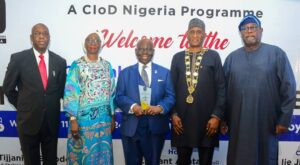


Nigeria on threshold of fundamental economic reform through tax bills – Minister
By Matthew Denis
The Minister of Information and National Orientation, Mohammed Idris has disclosed that the country is in the threshold of fundamental economic reform through the proposed tax reforms bills by President Ahmed Tinubu.
He made the disclosure while making his opening speech as the Chairman at the 2024 Annual General Meeting of the International Press Institute (IPI) Nigeria held in Abuja on Wednesday.
Speaking on the theme ‘Democracy, Media freedom and imperative of protecting Nigeria civic space’ the Minister said “it is my privilege to disclose to this distinguished audience, that our country is on the threshold of fundamental economic reform, verily unprecedented, largely known as the Renewed Hope Agenda – a deliberate and comprehensive recalibration of a long-neglected system geared towards economic diversification, human capital development, infrastructure, innovation, competitiveness, and inclusive growth.
“One of the most topical examples right now is the tax reform initiative, which will go a long way towards simplifying Nigeria’s existing tax regimes and making compliance easier, while also reducing the tax burden on the most vulnerable Nigerians.
” A recurring highlight of the reform is the introduction of several new tax exemptions, that will benefit various categories of individuals and businesses.”
According to him these tax reforms also complement ongoing macroeconomic reforms that are helping convert trillions of Naira that were previously lost to wasteful and abused subsidy programs, into substantial savings that are now able to finance productive sectors like high-impact physical and digital infrastructure, student loans and stipends, low-cost consumer credit, agricultural production, targeted social investment, and many more – all of the foundational elements required for a prosperous country that the world cannot ignore.
While acknowledging The effort of IPI he summoned that the Institute has built a formidable reputation over the last 74 years as a global platform advancing the rights, protection, and training of journalists.
The Minister noted that the Nigerian chapter has lived up to these ideals, and the caliber of Nigerian media executives and professionals who are associated with the IPI is a testament to the prestige it has garnered and maintained over the decades, and to the valuable place it occupies on the press landscape.
He revealed that the Nigerian press has produced, over the decades, some of Nigeria’s most talented and remarkable professionals, great writers, golden-voiced broadcasters, innovative entrepreneurs, and Proprietors. But beyond the professional talent, the greatest asset of the Nigerian press has been the boldness, the fearlessness in the face of intimidation, the irrepressible capacity to speak truth to power regardless of the cost.
“It is about understanding that for every right there is a corresponding responsibility, and that freedom does not come unbridled. It is knowing that media freedom involves knowing and acknowledging the immense power that the press wields, as shapers and molders of public opinion and the permanent public record, and not abusing this power.”
Earlier, the president IPI, Musikilu Mojeed while appreciating partners, sponsors, and supporters for making this conference possible said “your unwavering commitment to press freedom and democratic values is invaluable. To all participants, I encourage you to actively engage in the discussions, ask questions, and share your thoughts. Your contributions will undoubtedly enhance our efforts to promote democracy, media freedom, and civic space in Nigeria.
“Let us work together to build a society where journalists can operate freely without fear of intimidation or harassment. Let us advocate for policies that promote transparency, accountability, and the free flow of information.”
The Chairman of the Board of Trustees, Mallam Kabiru Yusuf stressed that the IPI focuses on a broader principle which is ensuring press freedom which underpins the work of journalists and the health of society as a whole.
He emphasized that Protecting this freedom ensures accountability and upholds the collective liberty of all citizens.
“Freedom, much like health, is often undervalued until it is lost. It is our duty as journalists to protect it, not just for our profession but for society at large. Journalism transcends sectional divides—it unites us in the pursuit of truth and accountability.”



